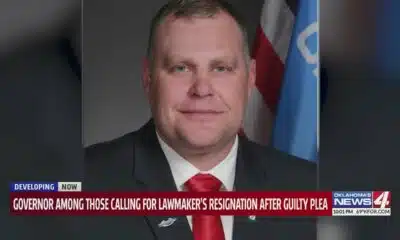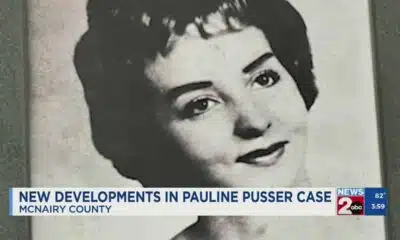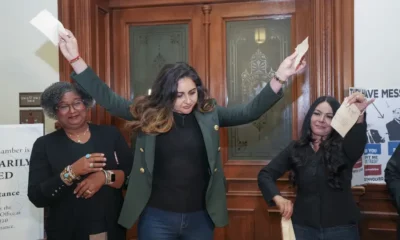News from the South - Virginia News Feed
One Good Thing: Paul Keyes RBI Award
SUMMARY: The Flying Squirrels are presenting the Paul Keyes RBI Award to Grady Little, a former Richmond Braves manager. Little managed the Braves for three years and led the team to the postseason each year. This award honors the late Paul Keyes, a respected VCU baseball coach. Grady Little is set to accept the award next Thursday at the Squirrels’ diamond. The recognition celebrates Little’s contributions and pays tribute to Keyes’ legacy in baseball. This event highlights the community’s appreciation for dedication to the sport and honors influential figures in local baseball history.
A former Richmond Braves manager is getting a big honor from the Flying Squirrels.
Share your #OneGoodThing ideas with us: https://www.12onyourside.com/2024/03/07/submit-photos-one-good-thing/
For more Local News from WWBT: https://www.12onyourside.com/
For more YouTube Content: https://www.youtube.com/channel/UCh-MRi3cyDN0DO1AvvVYFlg
News from the South - Virginia News Feed
CDC director Susan Monarez is fired and other agency leaders resign
SUMMARY: CDC Director Susan Monarez has been fired, prompting several high-profile resignations within the agency. Appointed in July, Monarez was removed after refusing to endorse what her legal team described as “unscientific, reckless directives” under the Trump administration and Secretary Robert F. Kennedy Jr. Dimitri Dust, director of the National Center for Immunization and Respiratory Diseases, also resigned, criticizing the CDC’s politicization and departure from scientific integrity. This turmoil coincides with new FDA COVID vaccine guidance and impending reports on autism causes. The controversy is part of broader tensions, including attempted firings and suspensions across federal agencies for dissenting voices.
The director of the nation’s top public health agency has been fired after less than one month in the job. The White House says Susan Monarez isn’t “aligned with” President Donald Trump’s agenda and refused to resign, so she was fired. Her lawyers said she was targeted for standing up for science. Also on Wednesday, some other top agency leaders said they are resigning. Monarez was sworn in on July 31 — less than a month ago, making her the shortest-serving CDC director in the history of the 79-year-old agency.
News from the South - Virginia News Feed
Voting rights case to ensure rolls aren’t purged too close to Election Day to move forward
by Charlotte Rene Woods, Virginia Mercury
August 28, 2025
A federal district court judge rejected defendants’ attempts to dismiss a voting rights case that first surfaced last summer when Gov. Glenn Youngkin ordered a purge of voter rolls that the U.S. Department of Justice, Democratic Virginia lawmakers and civil rights advocates said was too close to Election Day.
Over 1,600 people removed from voter rolls under Youngkin order; groups seek court injunction
In what its plaintiffs are calling a “major win for voting rights,” U.S. District Court for the Eastern District of Virginia judge Patricia Tolliver Giles is allowing the case to proceed and move into the next phase of legal scrutiny.
Filed by the Virginia Coalition for Immigrants’ Rights (VACIR), Virginia’s chapter of the League of Women Voters, and African Communities Together, the groups assert that Youngkin’s administration violated the federal National Voter Registration Act by removing people from voter rolls within 90 days of last November’s elections.
The federal law entails a 90-day “quiet period” that both former President Joe Biden’s administration and the Virginia groups’ suits alleged Youngkin violated.
Voter purge lawsuits add to disenfranchisement allegations against Youngkin administration
Youngkin had issued an executive order on Aug. 7, 2024 — exactly 90 days before the 2024 elections — before touting it on Fox News that same day.
A 2006 law does allow removals from rolls if people fail to indicate U.S. citizenship on Department of Motor Vehicle paperwork. The information is then sent to the State Board of Elections monthly. Youngkin’s order ramped the process up to daily, which raised concern about eligible voters being inadvertently removed, along with its occurrence within the 90-day “quiet period.”
In the Aug. 7, 2024 interview with Sean Hannity, Youngkin said the “daily scrubbing” of voter rolls was necessary to “make sure that in fact if an illegal immigrant either mistakenly or maliciously registers to vote, that person will be cleaned off the ballot immediately and turned over to our prosecuting attorneys to make sure that they are prosecuted to the full extent.”
Election officials said at the time that there was already a process in place to prevent undocumented immigrants from voting. The coalition’s suit argued that many removals were done without proper notification or investigation, leaving eligible voters unaware they could no longer cast their ballots. Plaintiffs in the lawsuit stressed that purges affect both longtime citizens who’d made paperwork errors and those who’d become naturalized citizens since their last Department of Motor Vehicles visits. Roughly 1,600 Virginians were affected, some of whom were able to get back on the rolls, but it was a challenge for them.
“An attack on naturalized citizens is an attack on citizens,” VACIR director Monica Sarmiento said on a press call Wednesday celebrating the advancement of the case.
Though the case sought an injunction last year, the U.S. Supreme Court allowed the purge to take place. In the new U.S. District court ruling, the case can move forward again.
“Now we will have the opportunity to depose officials who were involved, seek additional information, find out who is responsible, and make sure this doesn’t happen again,” said Anna Dorman, legal counsel with Protect Democracy, which was also involved in the case.
Beyond the lawsuit, state lawmakers tried to adjust the 2006 state law to further clarify federal law’s 90-day threshold. It cleared the legislature but was ultimately vetoed by Youngkin.
If the lawsuit prevails, plaintiffs said their goal is to prevent voters from being negatively affected when they seek to vote in next year’s congressional midterm elections.
YOU MAKE OUR WORK POSSIBLE.
Virginia Mercury is part of States Newsroom, a nonprofit news network supported by grants and a coalition of donors as a 501c(3) public charity. Virginia Mercury maintains editorial independence. Contact Editor Samantha Willis for questions: info@virginiamercury.com.
The post Voting rights case to ensure rolls aren’t purged too close to Election Day to move forward appeared first on virginiamercury.com
Note: The following A.I. based commentary is not part of the original article, reproduced above, but is offered in the hopes that it will promote greater media literacy and critical thinking, by making any potential bias more visible to the reader –Staff Editor.
Political Bias Rating: Center-Left
This content reflects a Center-Left political bias as it highlights concerns and legal challenges against a Republican governor, Glenn Youngkin, regarding voter roll purges. The article emphasizes the perspectives of civil rights groups, Democratic lawmakers, and voting rights advocates, portraying the voter roll purge as potentially harmful to eligible voters and aligned with efforts to protect voting rights. While presenting factual information and quotes from both sides, the framing and choice of sources indicate a leaning toward progressive viewpoints on election integrity and voter protections.
News from the South - Virginia News Feed
McLaurin joins Commanders for practice after signing extension | NBC4 Washington
SUMMARY: Terry McLaurin is back with the Washington Commanders after signing a three-year, $96 million extension. He practiced for the first time in months, energizing the team and fans. McLaurin expressed gratitude and peace about the deal, emphasizing the importance of communication and compromise in negotiations. He highlighted his faith and wife as key supports during the process. Coach Dan Quinn believes McLaurin will be ready for Week 1 against the Giants. McLaurin feels confident about his readiness and is eager to lead the team, calling the Commanders “home” and expressing excitement to continue playing football.
With contract extension negotiations behind him, wide receiver Terry McLaurin returned to the Washington Commanders’ practice …
-
News from the South - Texas News Feed5 days ago
Racism Wrapped in Rural Warmth
-
News from the South - Texas News Feed7 days ago
DEA agents uncover 'torture chamber,' buried drugs and bones at Kentucky home
-
News from the South - Missouri News Feed6 days ago
Donors to private school voucher program removed from Missouri transparency site
-
News from the South - Tennessee News Feed2 days ago
New developments in Pauline Pusser case
-
News from the South - Florida News Feed7 days ago
Ukraine’s independence-era voices say Russia’s effort to keep control has lasted decades
-
News from the South - Texas News Feed6 days ago
Texas Democrats’ walkout prompts GOP retribution
-
News from the South - Alabama News Feed5 days ago
Child in north Alabama has measles, says Alabama Department of Public Health
-
Our Mississippi Home5 days ago
After the Winds: Kindness in Katrina’s Wake










































